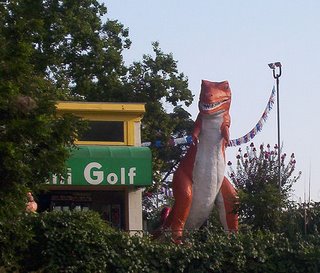Going Forward By Looking Behind - Mini Golf and Development
In Arlington, VA, a small controversy is taking place over a small parcel of open space adjacent to the Ballston Common Mall. There is a proposal to develop a mini golf course at the location which would reportedly be one of the first of its kind built in such a densely populated area. (Although, I have a hard time believing this.) And as reported in The Connection, "County Officials believe a miniature golf facility outside the mall will serve as an economic boon for Ballston, bringing more families into the rapidly changing neighborhood."
 T-Rexes will not make an appearance if the mini-golf project is approved.
T-Rexes will not make an appearance if the mini-golf project is approved.The plan has its critics, however. Members of the local business community have their doubts about the economic viability of the potential project considering its high density location. Considering other tentative proposals included developing a park, not exactly a money maker, I don't really see what the problem is. And doesn't high density mean more potential customers? Yes, it does also mean higher property values but it seems as though the land is owned by the county. We've come full-circle, as this project harkens back to mini golf's urban hey-day when courses appeared on the rooftops of buildings in some of the densest cities in the US. The county has not decided whether or not it will help subsidize the course. This will probably be a key component to whether or not this plan comes to fruition.
This would not be the first course to appear in the neighborhood:
For Arlington teenagers in the 1960s, a balmy summer Saturday night might have started with a slice of pepperoni pizza at Mario's and ended with a milkshake at Tops Drive-in and its jumping jukebox.
But the Putt-Putt miniature golf course in Ballston  located on the corner of Glebe Road and Wilson Boulevard  was the social hub of teenage life, even into the following decade.
'It was a great place for young people to hang around on an evening. There was very little supervision,' said Kathryn Holt Springston, a local historian and 1971 graduate of H-B Woodlawn, while laughing.
Metro came to Ballston in 1979, permanently altering the character of the neighborhood. Land values surrounding the Metro entrance sky-rocketed, and the owners of the mini-golf course sold the land to a developer several years later.
The loss of the golf complex was emblematic of the changes sweeping the neighborhood. Ballston was beginning to transform from a sleepy post-World War II suburb into a bustling urban center.
'The mini-golf course was the pride of the neighborhood,' said Dennis Burr, president of the Ballston-Virginia Square Civic Association. 'Everyone was upset when they tore it out and put in a high-rise.'
The question is, is nostalgia driving development? In some sense I sure hope so, even though a promise has been made not to include a 300' T-Rex.
Image: mittens oh my!
 tags: mini golf minigolf miniature golf pop culture
tags: mini golf minigolf miniature golf pop culture
0 Comments:
Post a Comment
<< Home